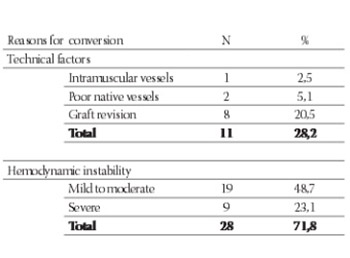Managament of Conversions to Cardiopulmonary Bypass in Beating Heart Coronary Surgery
DOI:
https://doi.org/10.17305/bjbms.2008.2931Keywords:
conversions, cardiopulmonary bypass, beating heartAbstract
This study investigated outcomes in patients undergoing coronary artery bypass grafting (CABG) without cardiopulmonary bypass (CPB), who needed conversion to CPB. Between September, 1998 and September, 2003, 1000 CABG procedures were performed in a Cardiovascular Clinic, University Clinical Centre Tuzla. Multivessel CABG were selected arbitrarily for CABG without CPB (OPCAB) or CABG with CPB (ONCAB). Patients who required conversion due to technical difficulty with grafting were performed with ONCAB including cardioplegic arrest. Patients with severe hemodynamic instability and cardiac arrest were performed as ONCAB without crossclamping, while patients converted for mild to moderate hemodynamic instability were given cardioplegic arrest or not, depending on surgeon preference. 493 operations were scheduled and performed as ONCAB (49,3%), 468 as OPCAB (46,8%) and 39 originally scheduled OPCAB operations were converted to ONCAB (7,7% of originally scheduled OPCAB patients or 3,9% of total number of CABG). Reasons for conversions were: mild to severe hemodynamic instability - 28 (71,8%); poor vessels or difficult graft revision - 11 (28,2%). Patients converted because of technical difficulty or mild hemodynamic instability behaved as regular ONCAB patients. In the 9 patients who were emergently converted due to cardiac arrest or ventricular fibrillation, 3 patients had stroke and 3 severe myocardial ischemia requiring intraaortic balloon pump. It is of great importance to keep conversions to CPB due to cardiac arrest at a low level. The serious complications seen in such patients can significantly impede the overall benefits of a successful OPCAB program.
Citations
Downloads

Downloads
Published
Issue
Section
Categories
How to Cite
Accepted 2018-01-04
Published 2008-08-20









